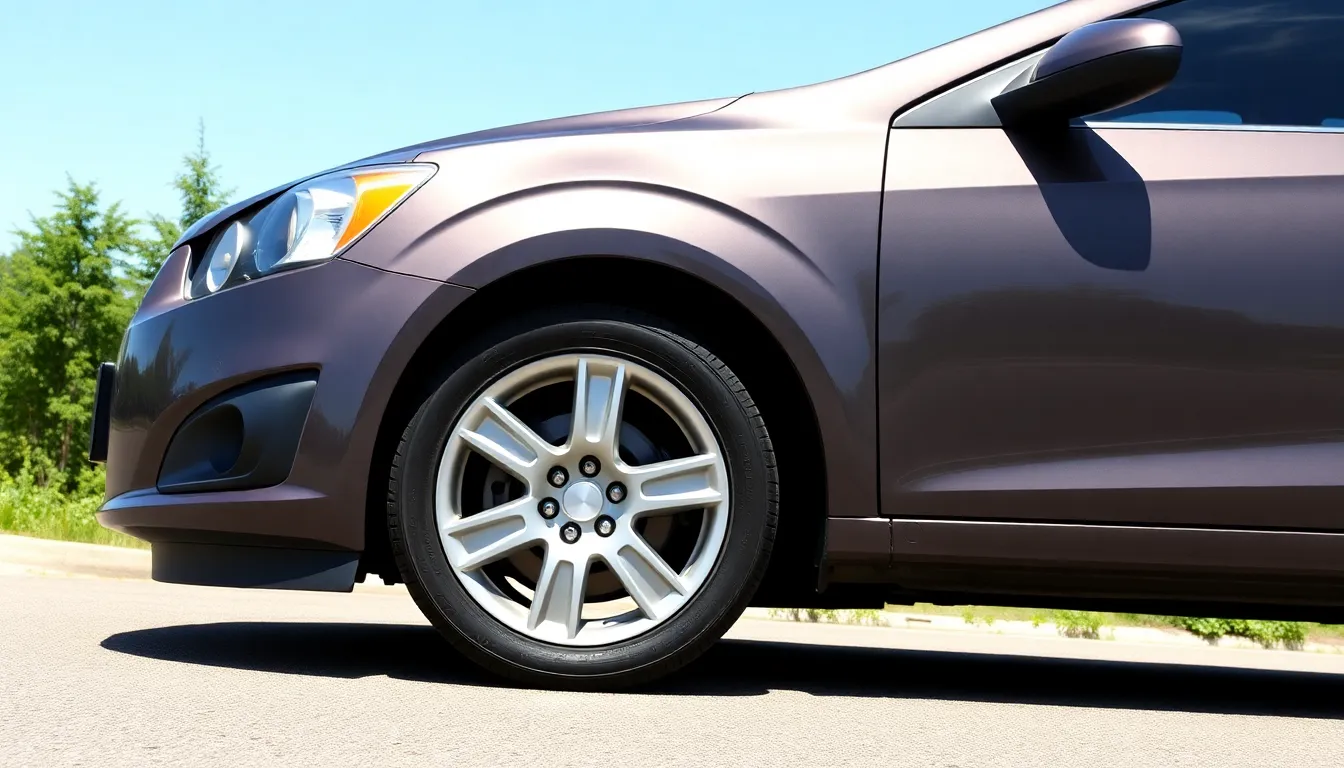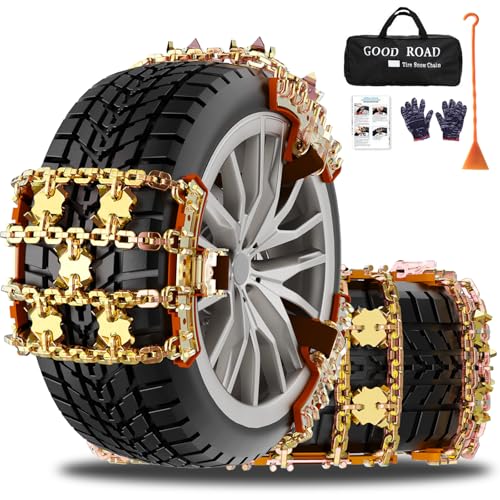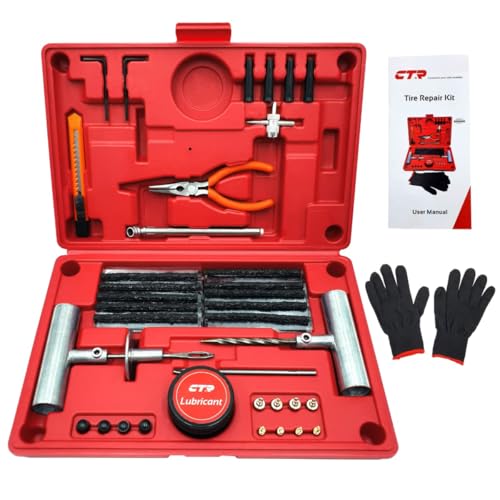Getting the right tire size for your 2015 Chevy Sonic isn’t just about safety—it’s about maximizing your car’s performance potential. Whether you’re replacing worn tires or considering an upgrade we’ve all been there trying to decode those confusing numbers on our sidewalls.
The 2015 Sonic came with different tire configurations depending on your trim level and we know how frustrating it can be to find accurate information. From the base LS model to the sporty RS package each variant has exact tire requirements that directly impact your driving experience fuel economy and overall safety.
We’ll walk you through everything you need to know about your Sonic’s tire specifications including OEM sizes alternative options and what those cryptic tire codes actually mean for your daily drive.
2015 Chevy Sonic Factory Tire Specifications
The 2015 Chevy Sonic comes equipped with exact tire sizes that vary based on the selected trim level and package options. Chevrolet designed each configuration to optimize performance characteristics for different driving preferences.
Standard Tire Size Options
The base tire configuration for most 2015 Chevy Sonic models features 195/65R15 dimensions. This size provides a balanced combination of fuel efficiency and ride comfort for everyday driving situations.
Upgraded trim levels receive 205/55R16 tires as standard equipment. These wider tires deliver enhanced handling capabilities while maintaining reasonable fuel economy ratings.
Performance-oriented configurations use 215/45R17 tire specifications. The lower profile design improves steering response and cornering stability during spirited driving conditions.
| Tire Size | Wheel Diameter | Aspect Ratio | Section Width |
|---|---|---|---|
| 195/65R15 | 15 inches | 65% | 195mm |
| 205/55R16 | 16 inches | 55% | 205mm |
| 215/45R17 | 17 inches | 45% | 215mm |
Trim Level Differences
LS trim models come standard with 195/65R15 tires mounted on steel wheels with plastic covers. Base configurations prioritize affordability and fuel efficiency over performance characteristics.
LT and LTZ variants receive 205/55R16 tires on alloy wheels as factory equipment. Mid-level trims balance comfort and performance through moderate tire sizing and improved wheel designs.
RS package models feature 215/45R17 high-performance tires on distinctive alloy wheels. Sport-tuned suspensions work with larger diameter wheels to maximize handling precision and visual appeal.
Hatchback and sedan body styles maintain identical tire specifications within each trim level. Chevrolet applied consistent sizing across both configurations to simplify maintenance and replacement procedures.
Performance and Handling Characteristics
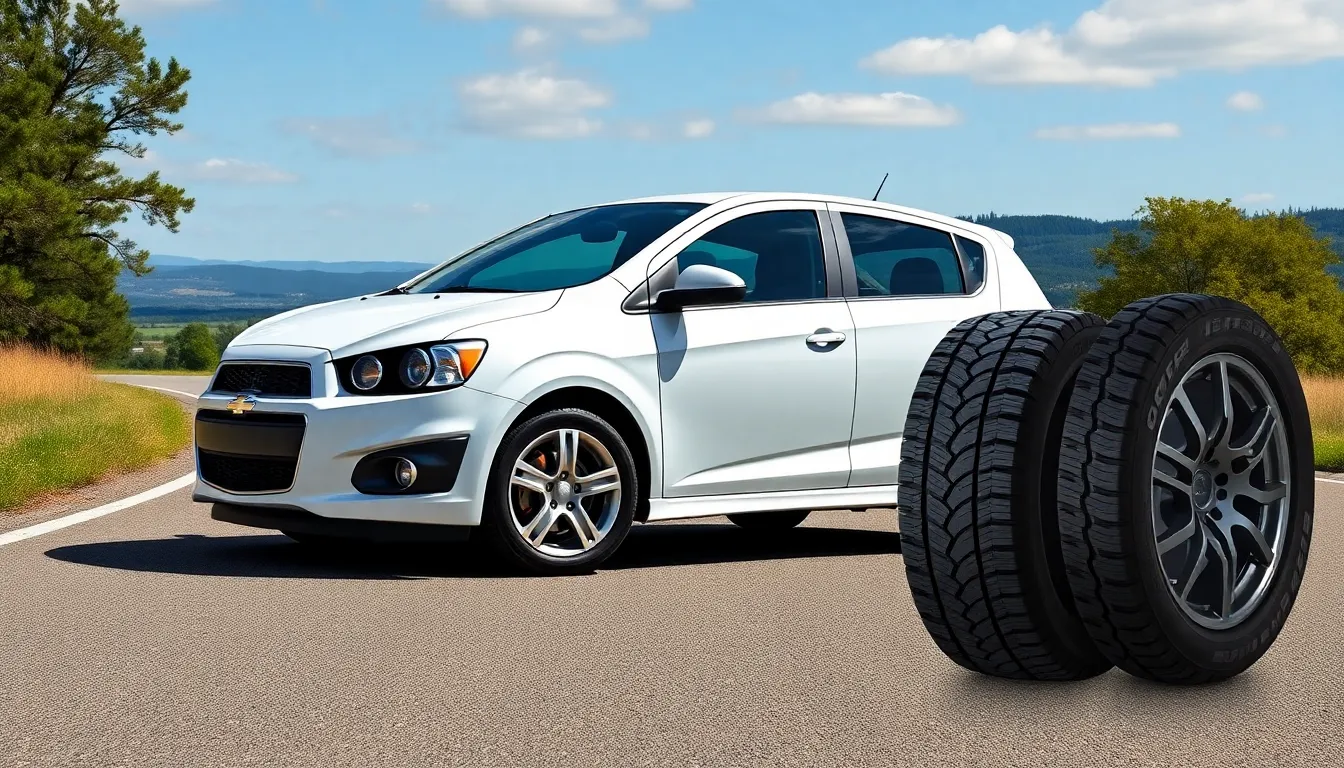
The tire size affects the vehicle’s performance and handling across different trim levels. Larger tires on the LTZ and RS models provide better stability and road grip compared to standard configurations.
Ride Quality with Stock Tires
Stock tires deliver a balance of comfort and performance across trim configurations. The 195/65R15 tires on LS models offer a softer ride due to their larger sidewalls, absorbing road imperfections more effectively. LT trim models equipped with 205/55R16 tires maintain comfortable cruising while providing improved cornering response. The 205/50R17 tires on LTZ and RS variants create a firmer ride quality but enhance handling precision through their lower profile design. This reduced sidewall height translates to better road feedback and more controlled steering input during ever-changing driving situations.
Fuel Economy Impact
Fuel efficiency varies with tire size across the 2015 Sonic lineup. The 195/65R15 configuration typically delivers the best fuel economy due to lower rolling resistance characteristics. These standard tires reduce the energy required to maintain highway speeds, contributing to improved miles per gallon ratings. Larger tire sizes like the 205/50R17 increase rolling resistance, which can decrease fuel efficiency by approximately 1-2 mpg compared to base configurations. Driving conditions and personal driving habits significantly influence these fuel economy differences beyond tire specifications alone.
Popular Tire Upgrade Options
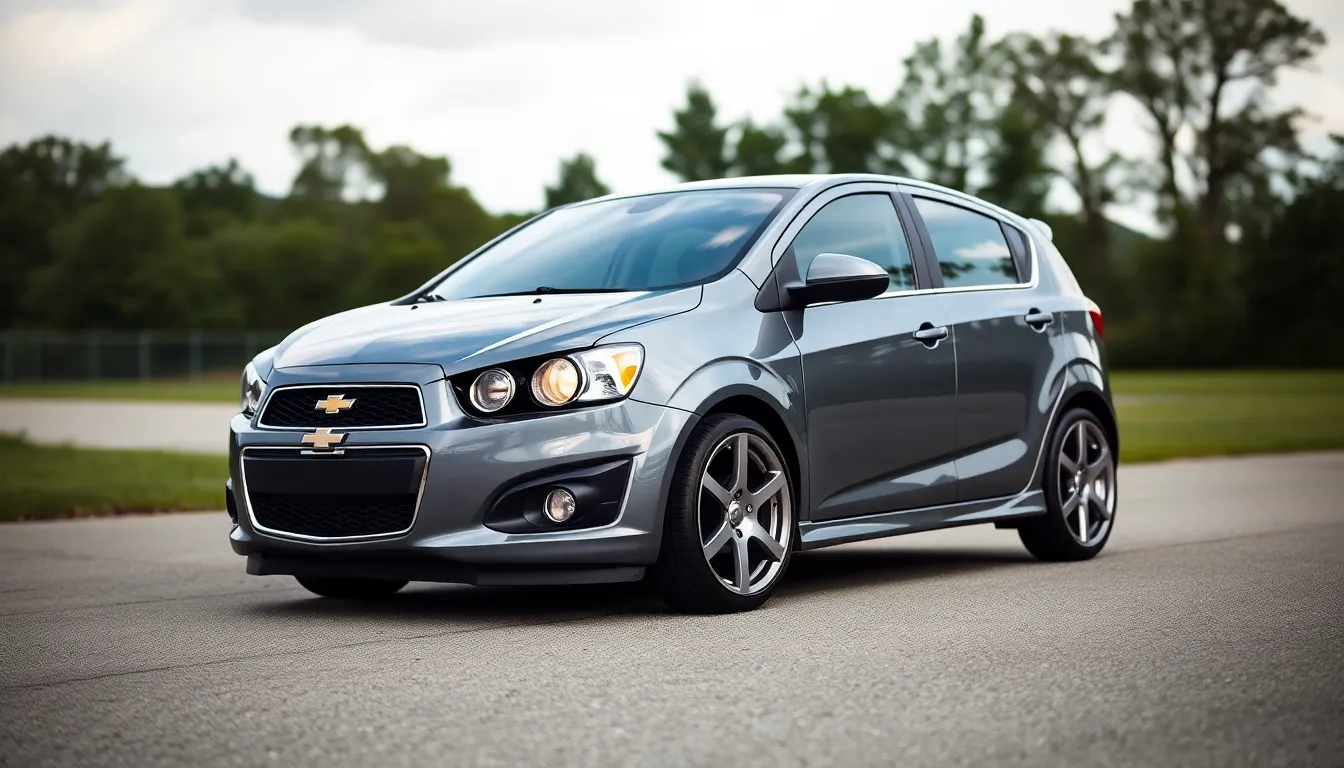
Upgrading your 2015 Chevy Sonic tires opens opportunities for enhanced performance, improved aesthetics, and better handling characteristics. Many Sonic owners explore alternatives to factory specifications to customize their driving experience.
Plus-Sizing Considerations
Plus-sizing involves installing larger diameter wheels with lower profile tires while maintaining the original overall tire diameter. The 2015 Chevy Sonic LTZ Dusk Package demonstrates this concept perfectly with its 215/45R18 configuration compared to the standard LTZ 205/50R17 setup.
Maintaining proper overall diameter prevents speedometer inaccuracies and preserves vehicle dynamics. Our calculations show that moving from 205/50R17 to 215/45R18 maintains nearly identical overall diameters, ensuring consistent performance metrics.
Fender clearance becomes critical when upgrading to larger wheel sizes. The Sonic’s wheel wells accommodate the factory plus-size options without modifications, but aftermarket upgrades may require suspension adjustments or fender modifications.
Rolling resistance changes with plus-sizing affect fuel economy and ride quality. Larger wheels with lower profile tires typically reduce sidewall flex, improving handling precision but potentially decreasing ride comfort on rough surfaces.
Performance Tire Alternatives
Performance tire options significantly enhance the 2015 Chevy Sonic’s handling capabilities beyond factory specifications. Goodyear Eagle F1 Asymmetric 3 tires represent popular upgrades that maintain compatibility with existing wheel sizes while improving traction and cornering response.
High-performance tires feature specialized tread compounds designed for superior grip in both dry and wet conditions. These alternatives work particularly well with the RS package’s 205/50R17 wheel configuration, maximizing the sport-oriented suspension setup.
Temperature ratings on performance tires often exceed factory specifications, with many options offering AA ratings compared to standard A ratings on OEM tires. This improvement translates to better heat dissipation during spirited driving or track use.
Tread life varies among performance tire alternatives, with most high-performance options providing 30,000 to 40,000 miles of service depending on driving habits and road conditions. Brands like Michelin, Continental, and Bridgestone offer performance alternatives that balance longevity with enhanced capabilities for Sonic applications.
Seasonal Tire Recommendations

Choosing the right tire type for your 2015 Chevy Sonic depends on your local climate and driving conditions. Different seasonal tire categories offer distinct advantages that match exact weather patterns and road surfaces.
All-Season vs Summer Tires
All-season tires provide balanced performance across various weather conditions, making them the most practical choice for most Sonic drivers. Michelin Defender T+H, Continental PureContact LS, and Goodyear Assurance WeatherReady represent popular all-season options available in the Sonic’s stock tire sizes. These tires deliver reliable traction in wet conditions and mild winter weather while maintaining reasonable performance during warmer months.
Summer tires excel in warm and dry conditions, offering superior grip and handling characteristics compared to all-season alternatives. Goodyear Eagle Sport and Bridgestone Potenza RE980AS+ come in Sonic-compatible sizes for drivers prioritizing performance during warmer seasons. But, summer tires become unsafe in cold temperatures below 45°F and provide inadequate traction on snow or ice-covered surfaces.
Performance differences between these tire categories become evident in handling precision and braking distances. Summer tires typically reduce stopping distances by 10-15 feet in dry conditions compared to all-season tires, while all-season variants maintain consistent performance across temperature ranges from 20°F to 100°F.
Winter Tire Options
Dedicated winter tires significantly improve safety and control when temperatures drop below 45°F or when snow and ice conditions occur. Bridgestone Blizzak WS80, Michelin X-Ice Xi3, and Continental WinterContact SI offer excellent winter performance in appropriate sizes for the 2015 Chevy Sonic. These specialized tires feature unique rubber compounds that remain flexible in cold temperatures and aggressive tread patterns designed for snow and ice traction.
Installing winter tires requires mounting them in complete sets of four to maintain vehicle stability and control. Mixing winter tires with other tire types creates dangerous handling imbalances that compromise safety during winter driving conditions. Winter tire performance typically improves braking distances on ice by 30-40% compared to all-season tires and provides substantially better acceleration and cornering grip in snow.
Storage considerations become important for winter tire users, as these tires require seasonal swapping and proper storage during warmer months. Most winter tires last 40,000-60,000 miles when used only during winter seasons, making them a cost-effective safety investment for drivers in cold climates.
Cost Analysis and Value

Understanding tire costs for the 2015 Chevy Sonic helps owners make informed decisions about replacements. We’ll examine both factory and aftermarket pricing options to determine the best value for your exact driving needs.
OEM Replacement Costs
Original equipment manufacturer tires for the 2015 Chevrolet Sonic vary significantly in price based on size and brand specifications. The 205/55R16 configuration costs between $60 and $150 per tire depending on manufacturer quality standards and performance features.
Dealership installations typically include additional fees for mounting, balancing, and disposal services. These services add approximately $20 to $40 per tire to the total replacement cost. Factory specifications ensure precise fitment and maintain the vehicle’s original handling characteristics established during development.
Premium OEM brands like Michelin and Continental command higher prices but deliver extended tread life. Budget OEM options provide adequate performance at lower initial costs while maintaining safety standards required for Sonic applications.
Aftermarket Alternatives
Aftermarket tire options for the 2015 Sonic offer expanded choices at competitive pricing structures. Goodyear and Michelin aftermarket alternatives range from $50 to $120 per tire depending on exact model features and performance capabilities.
Online retailers like Discount Tire provide extensive selection with convenient price comparison tools. These platforms often feature promotional pricing and rebate programs that reduce overall replacement costs by $40 to $80 per set.
Performance focused aftermarket tires deliver enhanced grip and handling response compared to standard replacements. All season aftermarket options balance durability with year round capability while maintaining compatibility with existing wheel configurations.
| Tire Type | Price Range | Installation Cost | Total Per Tire |
|---|---|---|---|
| OEM Standard | $60-$150 | $20-$40 | $80-$190 |
| Aftermarket Budget | $50-$80 | $15-$25 | $65-$105 |
| Aftermarket Premium | $90-$120 | $15-$25 | $105-$145 |
Budget conscious owners can achieve important savings through aftermarket selections without compromising safety standards. Performance enthusiasts benefit from specialized compounds and tread designs unavailable in original equipment specifications.
Installation and Maintenance Tips

Verification becomes crucial before purchasing replacement tires for your 2015 Chevy Sonic. We recommend checking the driver’s side door jamb label or examining the tire sidewall to confirm the correct size specifications for your exact trim level and package configuration.
Professional installation ensures proper mounting, balancing, and alignment of new tires. This approach helps prevent vibration issues, uneven wear patterns, and premature tire failure that commonly occur with improper installation techniques.
Proper fitment requires matching the correct width, aspect ratio, diameter, speed rating, and load index to your vehicle’s requirements. Each specification plays a vital role in maintaining safety standards and optimal performance characteristics of your Sonic.
| Maintenance Task | Frequency | Specification |
|---|---|---|
| Tire Rotation | 6,000-8,000 miles | Promotes even tread wear |
| Pressure Check | Monthly | Door jamb label specification |
| Tread Depth Inspection | Monthly | Penny test or gauge measurement |
| Tire Replacement | 6+ years | Age-based replacement recommended |
Rotation schedules every 6,000 to 8,000 miles promote even tread wear across all four tires. Regular rotation extends tire life significantly and maintains consistent handling characteristics throughout the tire’s service period.
Tread depth monitoring using the penny test provides a quick assessment method. Insert a penny into the tread grooves with Lincoln’s head positioned upside down; visible portions of his head indicate replacement necessity.
Inflation maintenance according to door jamb specifications preserves tire performance and fuel efficiency. Check tire pressure monthly and before extended trips, as proper inflation affects handling, wear patterns, and overall vehicle safety.
Age considerations matter beyond tread depth measurements for tire replacement decisions. Goodyear and most tire manufacturers recommend replacing tires that reach six years of age, even when tread depth remains adequate, due to rubber compound degradation over time.
Cost transparency during online tire purchases prevents unexpected installation fees. Confirm all charges before completing payment transactions to avoid surprises during the installation appointment process.
Conclusion
We’ve covered everything you need to know about 2015 Chevy Sonic tire sizes to make confident decisions for your vehicle. From understanding the factory specifications across different trim levels to exploring upgrade options and seasonal considerations your Sonic’s performance depends on choosing the right tires.
Remember that proper tire selection goes beyond just size – it’s about matching your driving needs with the right performance characteristics. Whether you stick with OEM specifications or explore aftermarket alternatives prioritizing quality installation and regular maintenance will maximize your investment.
Your 2015 Sonic deserves tires that enhance its capabilities while keeping you safe on the road. Take the time to research options within your budget and don’t hesitate to consult professionals when making your final decision.
Frequently Asked Questions
What is the standard tire size for a 2015 Chevy Sonic?
The standard tire size for most 2015 Chevy Sonic models is 195/65R15, which provides a good balance of fuel efficiency and ride comfort. This size is typically found on the base LS trim level with steel wheels.
Do different trim levels have different tire sizes on the 2015 Sonic?
Yes, tire sizes vary by trim level. LS models use 195/65R15 tires, LT and LTZ variants come with 205/55R16 tires on alloy wheels, and RS package models are equipped with 215/45R17 high-performance tires for enhanced handling.
How does tire size affect fuel economy on the 2015 Chevy Sonic?
The 195/65R15 configuration typically delivers the best fuel efficiency due to lower rolling resistance. Larger tire sizes like 205/55R16 and 215/45R17 can decrease fuel economy by approximately 1-2 mpg compared to the base size.
Can I upgrade to larger tires on my 2015 Sonic?
Yes, you can upgrade using plus-sizing, which involves installing larger diameter wheels with lower profile tires while maintaining the original overall tire diameter. Popular upgrades include the LTZ Dusk Package’s 215/45R18 configuration.
What are the best performance tire options for the 2015 Chevy Sonic?
Popular performance alternatives include Goodyear Eagle F1 Asymmetric 3 tires, which improve traction and cornering response. Brands like Michelin, Continental, and Bridgestone also offer performance options that balance longevity with enhanced capabilities.
Should I use winter tires on my 2015 Sonic?
Yes, dedicated winter tires significantly improve safety and control in cold and snowy conditions. They should be used in complete sets for optimal vehicle stability and are essential if you regularly drive in winter weather conditions.
How much do replacement tires cost for a 2015 Chevy Sonic?
OEM replacement tires for the 205/55R16 configuration range from $60 to $150 per tire, plus installation fees. Aftermarket alternatives offer competitive pricing from $50 to $120 per tire, providing savings without compromising safety standards.
How often should I rotate tires on my 2015 Sonic?
Tire rotation should be performed every 6,000 to 8,000 miles to ensure even wear. Additionally, check tire pressure monthly and inspect tread depth regularly using the penny test to maintain optimal performance and safety.
When should I replace my 2015 Sonic’s tires?
Replace tires when tread depth reaches 2/32 of an inch or after six years regardless of tread depth, as rubber degrades over time. Regular tread depth inspections and monitoring tire age help maintain safety and performance.

